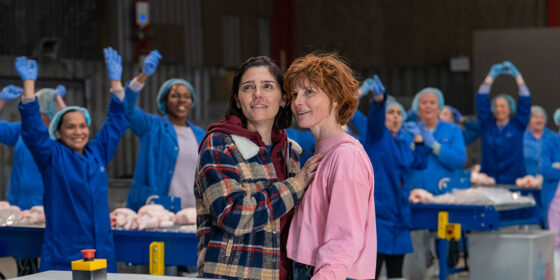TIFF 2023 | Chuck Chuck Baby (Janis Pugh, UK) — Centrepiece

By Madeleine Wall
Under the neon sign, middle-aged Helen (Louise Brealey) begins her night shift at the local chicken factory. Her days are all the same, and though she takes comfort in her friends and coworkers, she is unable to leave her dreary life. She lives with her separated husband Greg, who has a much younger girlfriend and new baby, and he takes half of Helen’s income to fund his stay-at-home lifestyle. His excuse is caring for his dying mother Gwen (Sorcha Cusack), but this too falls to Helen, though the two have a deeper bond than either ever did with Greg. Helen has put other people ahead of herself for years, driving back and forth from the council estates to work, day in and day out.
Chuck Chuck Baby, however, is a romance, and Helen is soon swept off her feet. Her former classmate Joanne (Annabel Scholey) has returned, having fled poverty and an abusive father years ago. Joanne is an out lesbian, and, as teenagers, she and Helen had unspoken crushes on each other. Joanne slowly woos the shy Helen, much to the delight of her coworkers and chagrin of Helen’s husband.
It is hard for Helen to express herself in day-to-day life, but she takes great relief in music. Chuck Chuck Baby is a jukebox musical in the truest sense, with each song played diegetically on the radio or an actual jukebox, with Helen, and occasionally Joanne, singing along. The pink and blue uniforms of the factory workers pop with colour, and women slam their chickens down in unison like in a Busby Berkeley film. What should be a dreary, working-class factory becomes a conduit back to classic musicals; for director Janis Pugh, music is communal and connecting, where people can share heartbreak and desire found in the most unexpected of places. Really, there’s no reason that a musical romance couldn’t happen to middle-aged, working-class lesbians, and, rote though it may be, Chuck Chuck Baby offers them the opportunity, bathed in warmth.
Madeleine Wall

